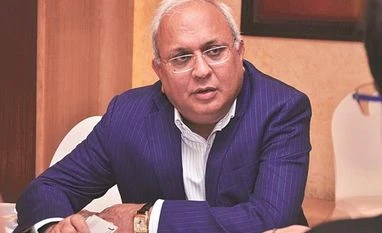PE funds partly behind the 62% drop in India's net FDI? Samir Arora's view
The ace fund manager was reacting on 'X' to a Business Standard story that quotes a Reserve Bank of India (RBI) data on gross FDI flows into the country in FY24
)
Samir Arora, founder and fund manager, Helios Capital
Listen to This Article
Private equity (PE) withdrawals, to some extent, could be behind the massive drop of 62 per cent in the net foreign direct investment (FDI) in India to $10.58 billion in fiscal 2023-24 (FY24), believes Samir Arora, founder and fund manager at Helios Capital.
"Today's Business Std worries that even though gross FDI is $71 billion, net FDI is only $10.6 billion and this is bad for medium term growth prospects. My guess is that large repatriations are due to selling by PE funds and this problem will become worse if India prefers PE over FII funds," Arora said in tweet on 'X' (formerly Twitter).
Today's Business Std worries that even though gross FDI is USD 71 billion, net FDI is only 10.6 billion and this is bad for medium term growth prospects.
— Samir Arora (@Iamsamirarora) May 24, 2024
My guess is that large repatriations are due to selling by PE funds and this problem will become worse if India prefers PE…
The ace fund manager was reacting on 'X' to a Business Standard story that quotes a Reserve Bank of India (RBI) data on gross FDI flows into the country in FY24, which suggests $44.4 billion was repatriated the last fiscal through dividends, share sale or disinvestment. READ ABOUT IT HERE
Also Read
Over the long term, Arora believes attracting 'real FDI money' that takes out dividends of around 2 per cent per annum is a better option than attracting PE funds, or even foreign institutional investor (FII) money that broadly stays invested over a period of time.
“As I tweeted recently, if PE funds invest $50 billion now, they will expect to take out $100 billion in approx 7 yrs and so on till it becomes unsustainable. Attracting FII money requires the least amount of effort or policy changes - just relax capital gains taxes. That will also help domestic investors, attract risk taking money, allow govt to raise good money from PSU divestments, collect money from higher STT collections etc.," Arora said in his tweet on 'X'.
Capital gains tax in India
Reports of changes in the capital gains tax structure have been doing the rounds off-late, with grapevine suggesting that Finance Minister Nirmala Sitharaman may tweak the capital gains tax rate, or the tenure to qualify for the long-term capital gains (LTCG) and short-term capital gains (STCG), or some combination of both the tenure and the rates.
This, analysts believe, will be a setback for the Indian stock market, which expects policy stability and continuity once the new government assumes charge post the Lok Sabha election outcome on June 4.
On its part, the finance minister, too, has cleared the air that in case the Narendra Modi-led National Democratic Alliance (NDA) is voted back to power, the government is looking at policy continuity amid a stable regime.
Dividend bounty
The Reserve Bank of India (RBI), meanwhile, has transferred a record Rs 2.1 trillion as dividend to the government. This, analysts at HSBC believe, was led by higher interest earned on forex (FX) reserves and higher foreign exchange sales.
Wonder where this is come from. Was not even double checked with @Finmin. Pure speculation.
— Nirmala Sitharaman (Modi Ka Parivar) (@nsitharaman) May 3, 2024
Sorry, @CNBCTV18Live speculation, particularly during #LokSabhaElection2024 https://t.co/Qk0socShVU
"The government can also choose to spend the bounty. Its dominant spending thrust has been on capex over the last few years. And even for FY25, there is a provision for a 17 per cent increase in funding. Instead, the government may prefer to shift focus to current expenditure. Worth noting that current expenditure, particularly on social schemes, is budgeted to fall sharply in the interim budget (by 0.6 per cent of GDP in FY25)," wrote Pranjul Bhandari, chief economist for India and Indonesia at HSBC in a recent note.
More From This Section
Topics : Private Equity Nirmala Sitharaman Income tax Private equity firms private equity funds Private equity investments Private Equity exits Private equity deal Samir Arora Samir Arora Helios Capital Twitter RBI India FDI FDI outflow Finance minister Tax on capital gains Capital gains tax relief LTCG tax STCG Tax terrorism income tax law
Don't miss the most important news and views of the day. Get them on our Telegram channel
First Published: May 24 2024 | 11:27 AM IST


